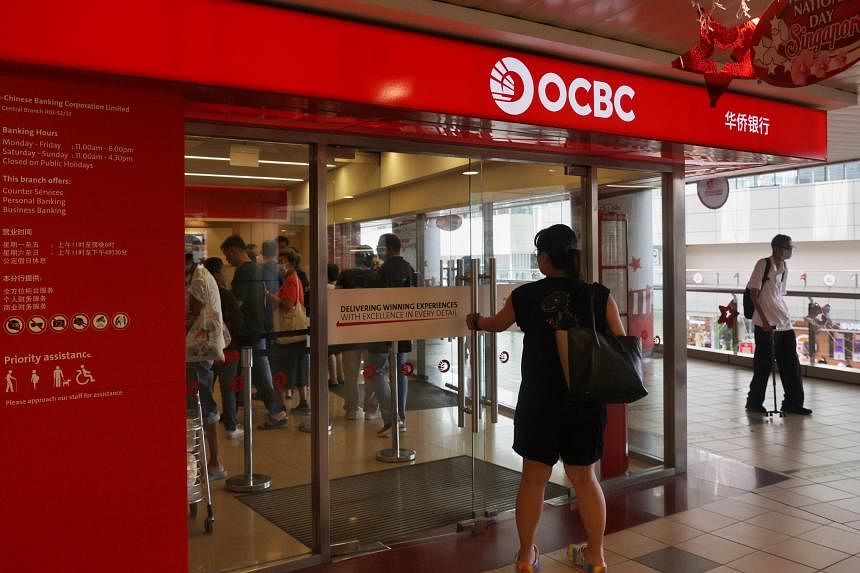SINGAPORE - OCBC Bank on Friday posted third-quarter earnings that were boosted by record net interest income, even as its chief executive said the macroeconomic outlook is getting cloudier.
The net profit of Singapore’s second-largest bank rose 21 per cent year on year to $1.81 billion, in line with estimates by analysts in a Refinitiv poll.
For the first nine months, OCBC’s net profit grew 32 per cent to a new high of $5.4 billion, marking the first time it had crossed $5 billion for the period.
OCBC’s results wrap up Singapore banks’ earnings season, with largest lender DBS on Monday posting a 16 per cent year-on-year rise in third-quarter net profit to $2.59 billion, and UOB on Oct 26 reporting a 5 per cent increase in core earnings to $1.48 billion.
Although rising interest rates have lifted margins, they also mean that lenders will have to grapple with reduced demand for loans, adding on to other challenges in the global environment.
OCBC expects net interest margin (NIM), a key profitability gauge, to be around 2.25 per cent for the full year, said group chief executive Helen Wong.
This is lower than the 2.28 per cent NIM in the first nine months of 2023, though higher than the 2.2 per cent NIM it projected earlier for the year.
The bank also sees 2023’s return on equity above 14 per cent but loan growth in the low single-digit range, reflecting market conditions, versus earlier projections of low-to-mid single-digit growth.
Ms Wong said fresh geopolitical tensions have weighed on the macroeconomic environment, and there are uncertainties over whether they will escalate and, separately, when interest rates will be cut.
“Trade loans are not doing very well because the trade volume around the region has not rebounded as much as people have hoped for,” she said, adding that corporate and Singapore housing loans have fared better.
“While we are firmly on track to deliver on our 2023 targets, we need to continue to be very prudent and make sure that our capital, liquidity and funding base are strong.”
For the third quarter, net interest income rose 17 per cent to a new high of $2.46 billion. It was driven by 6 per cent asset growth and a 21 basis-point increase in NIM to 2.27 per cent.
Loans grew 1 per cent in constant currency terms to $298 billion.
Non-interest income rose 4 per cent to $973 million as higher fee income and improved investment performance offset lower insurance income.
Net fee income rose 2 per cent to $461 million – the highest level recorded in the past four quarters – largely due to higher credit card fees and a growth in wealth management fees from increased customer activities.
However, Ms Wong said: “I wouldn’t paint too rosy a picture as we need to see the momentum in fee income growing. I think investors are still sitting a bit on the fence as to whether they would actively go into more wealth management activities.”
Net trading income, mainly comprising customer flow treasury income, was stable year on year at $216 million.
Profit from the bank’s insurance arm Great Eastern Holdings stood at $220 million, down 12 per cent from a year ago, largely due to an increase in medical claims which was partly compensated by improved investment performance.
She said OCBC has doubled down on capturing wealth, trade and investment flows in its key markets of Singapore, Malaysia, Indonesia and Greater China.
“This year, in particular, we have done more syndicated loans for our customers in Greater China,” she said, adding that the bank recently introduced 10 Chinese tech companies to its clients in Indonesia whom they could potentially partner.
“This helps us to grow because we increase the customer’s share of wallet. We don’t just bank them in China – we bank them in Singapore, and we’re now starting to bank them in Indonesia as well.”
OCBC has a clear strategy in China, even as the country’s economic recovery remains patchy.
Ms Wong said: “We are helping Chinese customers and individuals as they venture overseas. That’s where we can provide the most effective assistance to them and on that front, I still see very positive momentum.”
The bank also saw greater inflows of net new money. Assets under management in its wealth management business expanded 8 per cent to $270 billion as at Sept 30.
Its total wealth management income, which comprises income from businesses such as insurance, private banking, asset management and stockbroking, grew 16 per cent to $1.12 billion.
Its exposure to Singapore’s $2.8 billion money laundering case is insignificant, said Ms Wong.
On investments in technology, she said the bank has been using generative artificial intelligence tools to improve staff productivity in areas such as research and coding, but stressed that its data is contained internally.
Total allowances set aside for potential bad loans were $184 million, compared with $154 million a year ago, largely due to higher specific provisions for corporate accounts in a range of sectors.
OCBC wrote back or restored to profit $36 million in general allowances. Its non-performing loan ratio improved to 1 per cent, from 1.2 per cent a year ago.
OCBC shares closed 0.69 per cent lower at $12.97 on Friday.
DBS dipped 0.57 per cent to $33.17, while UOB dropped 0.94 per cent to $27.40.


